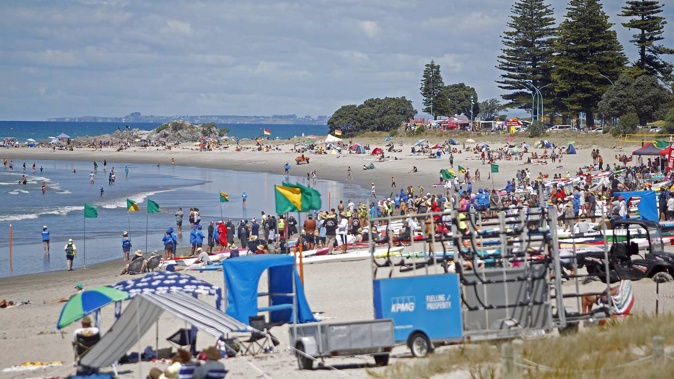
Beachgoers in the lower half of the country can rejoice, with an approaching marine heatwave expected to bring “balmy sea temperatures”.
However, the warm ocean temperatures could also result in more rainfall on land.
MetService oceanographer Joao de Souza says severe marine heatwaves are forecast for the bottom of South Island, where sea surface temperatures will reach 4C or more above average.
“Sea surface temperatures are rising rapidly at the moment along the West Coast of the South Island, in Fiordland, around Stewart Island and towards the Otago Peninsula,” Souza said.
/cloudfront-ap-southeast-2.images.arcpublishing.com/nzme/IQ7VQNIK4JGG5OD6D4JEKXZV6U.png) Difference between forecast and average long-term sea surface temperatures. Photo / MetService
Difference between forecast and average long-term sea surface temperatures. Photo / MetService
“The marine heatwaves we’ve seen building since before Christmas are expected to reach a new high Wednesday, with coastal patches off the West Coast forecast to reach 4.7C above average for this time of year.”
The oceanographer said Fiordland will also experience high water temperatures around this time, and around Stewart Island extending towards the Otago Peninsula.
“We’re expecting a ‘severe’ marine heatwave later on in the week, on January 5-6. Then, surface temperatures are forecast to reach 18.4C, compared to the 13.5C average – a difference of almost 5C.”
/cloudfront-ap-southeast-2.images.arcpublishing.com/nzme/X3E2Y6QP5ZBQ3CPXTT5WKT3ELQ.png) Sea surface temperature forecast. Photo / MetOcean
Sea surface temperature forecast. Photo / MetOcean
He said this will be good news for holidaymakers, who will get to enjoy balmy sea temperatures.
“However, the warm ocean temperatures sometimes cause more rainfall on land,” Souza said.
“A warmer sea heats the air travelling over it and because warmer air can mean more moisture, we can get more rain.”
But although the heat wave could be a good thing for holidaymakers, Souza warned that persistent marine heatwaves may cause problems for marine life.
“Abnormally warm sea temperatures can potentially harm marine life,” he said.
“Last year, a similarly warm marine heatwave in Fiordland reached great depths and caused widespread bleaching of sea sponges, and recent West Coast kelp disappearance has also been attributed to marine heatwaves.”
Water safety experts are also urging beachgoers to take extra care around the ocean, lakes and rivers, with the summer holidays representing the peak danger period for drownings.
Take your Radio, Podcasts and Music with you









